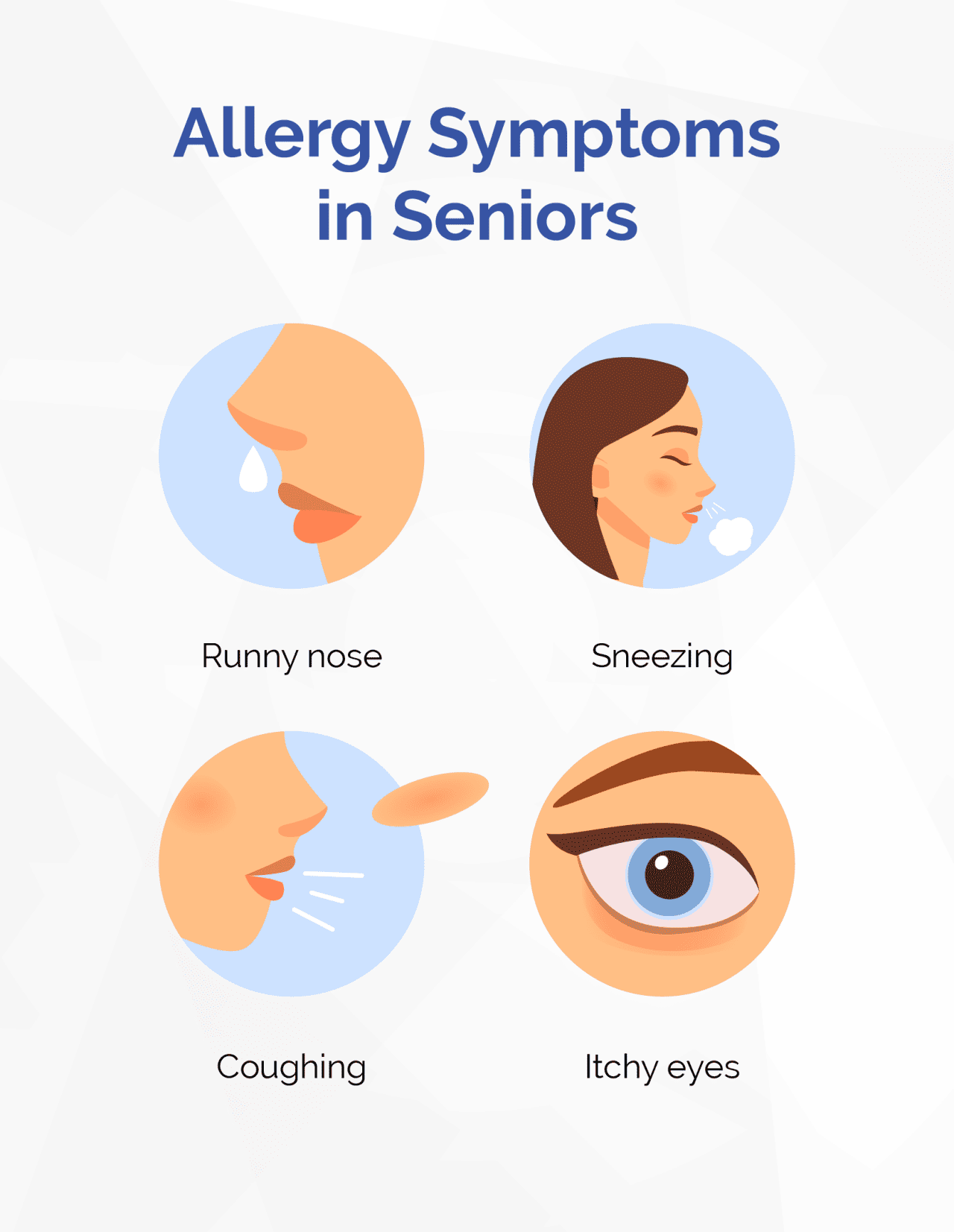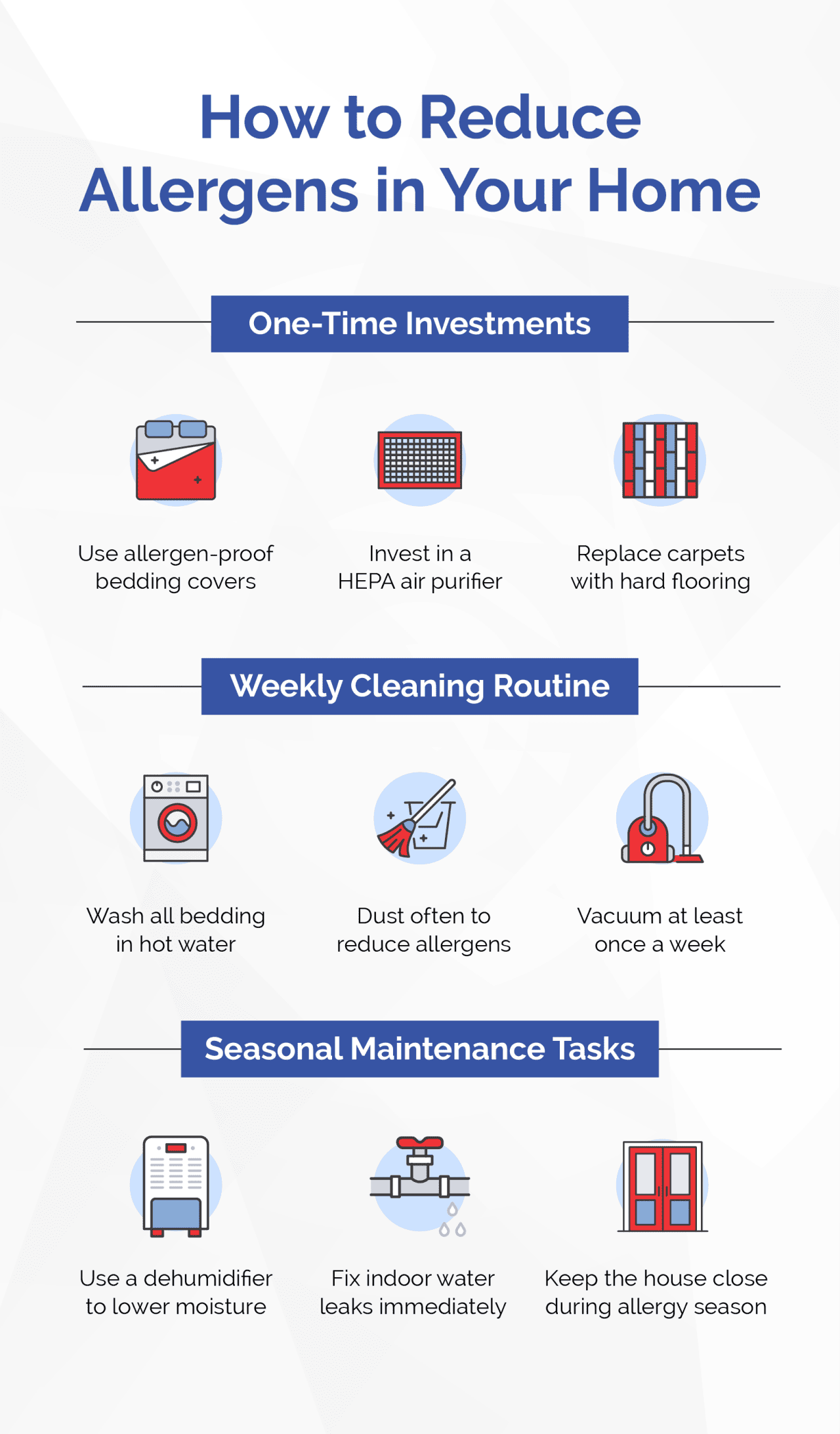If you’re the primary caregiver for an older relative, there’s probably a lot on your mind. You may be completing housework, cooking nutritious meals, driving them to doctor’s appointments, and running errands so they can rest at home. Another important aspect of senior health to consider is allergies.
Adults may experience allergies for the first time as they get older, and you may be unsure how to treat the symptoms. Because older adults are often on medications, you don’t want to give them additional medicine that could interact with their usual medications or cause unwanted side effects.
In this guide from Village Caregiving, you’ll learn how to help seniors manage their allergies through lifestyle changes and effective treatment options. Regardless of what type of allergy seniors have, there are solutions and treatments to help them feel better. With a few simple steps, you can reduce allergy symptoms and keep your loved one more comfortable.
Allergies in seniors range from mild discomfort to a bad cold or rash. Some common symptoms could mean an older adult is having an allergic reaction:

Allergies can also cause seniors to feel more fatigued than usual. Sometimes, you’ll notice the onset of allergy symptoms after exposure to a specific allergen, like pollen in the fall or eating a certain kind of food. Allergic reactions differ depending on the allergen, with food allergies often causing gastrointestinal issues.
If an older adult in your life already has a weakened immune system or a chronic health issue, allergies can cause more serious symptoms because their body is already tired. Noticing and treating these symptoms can ease discomfort and bring relief, allowing your loved one to enjoy their daily experiences.
Because older adults can be more sensitive to side effects from medication, it’s important to use allergy treatments that won’t cause sedation, raise blood pressure or increase the risk of a fall. Before trying an allergy medication, always consult with the senior’s doctor and read labels carefully so you understand potential risks.
Speaking to an older adult’s doctor is also important because many medications can interact. If a senior family member is already on critical medications, supplementing them with certain allergy medications could be unsafe. Before starting your loved one on a new allergy medication, have them try lifestyle changes that don’t have side effects.
Often, you can improve senior allergies by keeping the environment allergen-free. Some older adults are allergic to dust mites, so dusting frequently, vacuuming and using an air purifier can reduce their allergy symptoms. Seniors with seasonal allergies can plan to stay inside when there’s a high pollen count or when certain plants are blooming.
Staying active and eating a healthy diet can also improve allergy symptoms by boosting seniors’ immune systems and overall health. Many foods have probiotics and natural antihistamine properties, and eating more of these foods during allergy season can help reduce symptoms. Some of these foods include:
You can also purchase supplements that may help with allergy symptoms. Vitamin C, probiotics, stinging nettle, quercetin, and bromelain have properties that can improve health and allergy symptoms. Most of these ingredients can also be found in foods you can incorporate into your loved one’s diet.
If lifestyle changes aren’t making enough of a difference, consider combining them with medication that’s appropriate for older adults with allergies.
Always consult with a doctor to ensure new medications are OK before starting them. Here’s a quick overview of allergy medications for seniors, as well as ones to avoid:
When treating allergies in seniors, avoid using first-generation antihistamines like Benadryl and Chlor-Trimeton, as common side effects include confusion and sedation. Some decongestants like Sudafed can also increase blood pressure and heart rate, so older adults with hypertension or heart issues should avoid using them.
Some seniors can also benefit from immunotherapy, a long-term treatment that helps reduce the body’s reaction to allergens. Immunotherapy might mean getting a series of shots or following a schedule of taking tablets or drops. Over time, these treatments increase the body’s ability to handle exposure to an allergen without a bad reaction.
While immunotherapy works well for some older adults, it isn’t ideal for everyone. If seniors have an autoimmune disease, are on beta-blockers or have an unstable circulatory system, this type of allergy treatment isn’t a good fit. Before starting immunotherapy, speak with a doctor and do research to understand potential risks.
Many seniors are already on medication to manage health conditions. Sometimes, it can be hard to tell if symptoms are from allergies, a cold, or another condition. To find safe allergy treatments for seniors, it’s important to look at the whole picture of their health, including their health history and potential allergen triggers.
If you start to notice allergy symptoms in a loved one, keep a record of what they are and when they show up. Look for patterns and take your loved one to the doctor if symptoms persist or worsen. Allergy symptoms can exacerbate some conditions, like asthma or eczema. Seeing a doctor can help your loved one find relief until allergens are removed from their environment.
Older adults may experience different kinds of allergies, depending on their medical history, exposure to triggers, and other medical conditions. Common types of senior allergies include:
Allergy symptoms can be challenging to trace, but a little detective work can help you uncover the cause and find the appropriate treatment. If you notice allergy symptoms but aren’t sure of their cause, talk to your loved one’s doctor to see what they think. In the meantime, there are practical steps you can take to reduce exposure to potential allergens.
Regular housecleaning can help reduce the allergens in your home. You can also consider switching cleaners out for those with natural ingredients, as some people are sensitive to cleaning chemicals. Here are several simple ways to reduce allergens in your home:

A few one-time housekeeping tasks can make a difference for seniors with allergies throughout the year. Here’s a quick list so you can set up your loved one’s home for fewer allergies:
These one-time actions promote an allergen-free environment that can reduce allergy symptoms year-round for your loved one. If you know they’re allergic to dust and dust mites, you could also consider having the ducts in their home professionally cleaned for higher-quality indoor air.
Completing these housecleaning tasks once a week can help reduce allergens in your home. You probably do most of these chores already, and they can largely cut down on dust mites, pet dander and other particles that trigger allergy symptoms in seniors:
These simple cleaning tasks can reduce allergy symptoms for older adults. If you notice your loved one is having an allergic reaction and they don’t leave their home often, these steps can make a significant difference for the air quality and allergen count inside their home.
In addition to weekly chores, you can complete a few tasks seasonally to reduce allergens in your home. Here are three steps to take at different times of the year, depending on the climate and conditions where you live:
When the weather warms up, mold and dust mite growth are more of a concern. If you’re keeping your doors and windows closed during pollen season, use an air purifier to keep indoor air fresh and healthy. Cleaning tasks will vary depending on the seasons, but a few simple actions can make a substantial difference for seniors who rarely leave home.
Allergies can cause discomfort for older adults, especially if they aggravate existing health conditions. Thankfully, you can take many practical steps to reduce seniors’ exposure to allergens, treat their symptoms and help them feel better. It’s important to approach allergy symptoms holistically, starting with lifestyle changes and then trying medications if those changes don’t help.
If you’re unsure whether a senior’s symptoms are caused by allergies or another health condition, talk to your loved one’s doctor and do supplemental research to understand their health from a wider perspective. You need to ensure allergy medications don’t interact with their usual medications or cause negative side effects.
Follow these tips to reduce allergy symptoms in seniors so they can enjoy spending time outside and experiencing daily life at home. With the right support and treatment, allergy symptoms don’t have to cause chronic discomfort.
This story was produced by Village Caregiving and reviewed and distributed by Stacker.
Reader Comments(0)